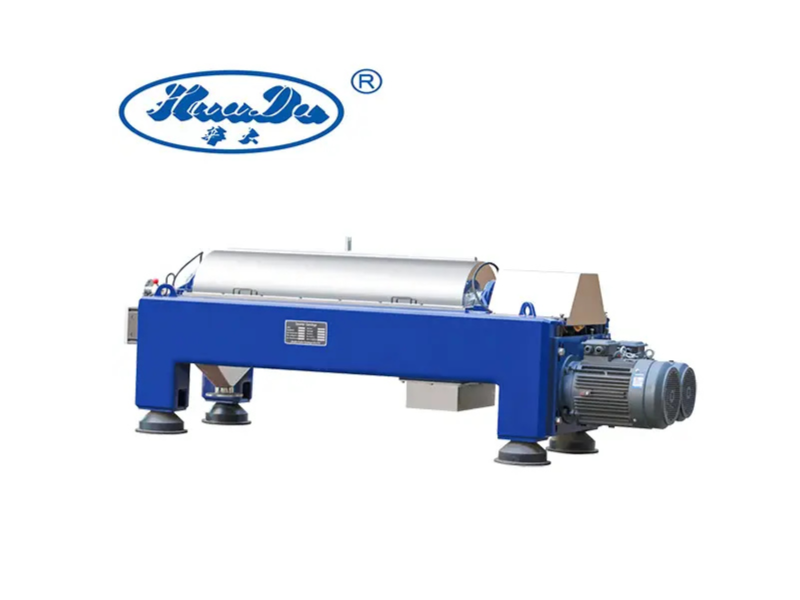最近、グリーンオペレーションへの注力がより現実的なものとなっています。世界中の加工施設や工場では、環境への影響を分析し、効率を向上させ、負荷を低減する方法が模索されています。そのような解決策の一つがデキャンターセンチフュージ(遠心分離機)です。これは遠心力を用いて液体から固体を分離するシンプルな装置であり、静かなるヒーローとして環境保護の champions です。生産工程における廃棄物、水、エネルギーの削減に貢献し、よりクリーンなプロセスを実現します。スラリー、プロセス廃棄物、または廃水を扱うすべての業界において、環境影響の理解と改善は、最新のデキャンターセンチフュージ装置によってもたらされる恩恵を受けます。これは単なるポジティブな影響や規制遵守の問題ではなく、責任あるビジネス運営であり、良好な環境影響を通じて持続的な利益を得ることにつながります。

遠心分離機を使用することで、廃棄物を大幅に削減できます。すべての工業プロセスでは液体廃棄物またはスラリーが発生します。食品製造や化学製品の製造では、これらのプロセスが大量の廃棄物を生み出すことが多く、廃液には浮遊固体やスラッジがよく含まれています。このようなスラッジを埋立地まで輸送するには、非常に高額な費用がかかり、環境への負荷も大きくなります。水を運ぶだけのためにダンプトラックが何往復も走行し、温室効果ガスを燃焼・排出することになります。
デカンターセンチフュージの最も重要な利点は、スラリー中の水分をどれだけ除去できるかであり、実際に脱水されたケーキを生成することができる点です。多くの人々は、スラッジを埋立地へ運搬する大型トラックの光景や、それに伴う多額のコストに慣れ親しんでいます。しかし、脱水装置を使用してスラリー10トラック分を処理し、ケーキにすることで2〜3トラック分まで削減できる場合、輸送コストがいかに大きいかを知るとほとんどの人が驚きます。さらに、トラックからの排出ガスや温室効果ガスの発生も考慮する必要があります。これらの排出量は大幅に削減されるため、環境面での大きなメリットとなります。廃棄コストも確かに低下し、これは廃棄物の削減にもつながり、埋立地への負担を軽減します。多くの場合、複雑な議論には深入りせず、経済的なメリットや環境への悪影響の低減といった肯定的な側面を強調することが求められます。また、それにより長期的に浸出液が廃棄物や環境から流出することをより適切に管理できるようになります。結論として、廃棄コストは低下し、廃棄物の削減によって埋立地の負担が軽減されるのです。
世界的に高まる水不足への懸念から、工業プロセスからの排水を再利用することは、もはや贅沢ではなく、むしろ必然となっています。この点でも、デキャンターセントリフュージ装置は環境に対する確実なプラスの影響を発揮する分野の一つです。多くの産業廃水は単なる廃棄物ではなく、水やその他の貴重な資源が含まれた複雑な混合物です。以前は、こうした水は失われており、放流前に排水として処理され、貴重な資源の完全な損失となっていました。
デカンターセンチフュージは固液分離において非常に効率的であり、得られる液体は極めて透明になるため、廃水処理プロセスで直接再利用できます。スラッジを濃縮するデカンターを備えた廃水処理場を想定してください。分離された上澄み液(セントレート)は処理場の先端部へ戻すことができ、飲料水の追加使用量を削減できます。製紙工場や金属加工工場などの水を使用する製造プロセスでは、デカンターによって回収された水を冷却して再利用することが可能です。これはクローズドループまたは半クローズドループ型の水システムであり、河川、湖沼、または市町村からの淡水総使用量を大幅に削減します。
水効率の高い取り組みを通じて、淡水供給から失われつつある資源を地域社会に再び還元することは極めて重要です。これにより貴重な天然資源を節約できるだけでなく、施設が環境へ排出または公共下水処理場へ送る必要のある水量も削減できます。その結果、公共の水インフラへの負担や、廃水処理に伴うエネルギー・化学薬品費用を低減することが可能になります。デカンターセンチフュージュ装置を設計・利用する産業界は、資源の再利用および参加型の水管理、持続可能な水管理の分野で先導的な役割を果たしています。
分離プロセスにおける化学薬品の使用は広く行われており、特に水および廃水処理で一般的です。ポリマー(凝集剤および共凝剤)の形態で用いられるこれらの化学薬品は、微細な粒子を凝集させ、沈降を容易にするために使用されます。これにより対象とする固形物を効率的に分離できますが、このアプローチに伴う環境への影響は大きな懸念事項です。これらのポリマーは危険な化学原料から製造されるため生産時に多大なエネルギーを要し、使用後も環境に対して持続的な悪影響を及ぼし続けます。残留したポリマーはスラッジや排水中に残存し、有害な微生物を除去することを目的とした生物学的処理プロセスを通じて、さまざまな毒性作用を引き起こす可能性があります。
現代のデカンターセンチフュージのさらなる利点は、機械的に非常に効率的であるため、化学薬品への依存が少なくて済むことです。デカンターから生じる巨大な遠心力によって、大量の化学薬品を使用せずに極めて微細な粒子を容易に分離できます。依然として、全体的な性能を高めるために少量のポリマーが必要となる場合もありますが、重力沈降槽や溶存気浮上法などの従来の分離技術と比較して、ポリマーの使用量は通常ははるかに少なくなります。
環境面では、2つの分野で改善が見られます。1つ目は、化学薬品の製造および輸送に伴う上流工程での環境負荷の低減です。2つ目により重要な点は、最終製品がより清潔で化学汚染の少ないものになることです。脱水された固形ケーキはより「自然」な製品となり、合成ポリマーが環境中に放出されるという懸念がないため、堆肥や農業用土壌栄養材などとしての有効利用が容易になります。回収された液相も、化学汚染物質が少なく高品質となるため、再利用がより簡単かつ安全になります。化学薬品ではなく機械的な力により分離を行うデカンターセンチフュージュ装置は、産業分野においてより低毒性でクリーンな分離方法を提供します。
産業廃棄物を直接ごみ捨て場に運ぶ代わりに、デキャンタ遠心機はそれを企業が販売可能な資源へと変えることができます。このような廃棄物の除去プロセスは「廃棄物から資源への転換(waste-to-resource)」と呼ばれます。これは循環型経済の一環でもあり、その作業においてデキャンタは最も重要なツールです。場合によって、デキャンタによって生成される固形廃棄物は、単に地中に埋めるための廃棄物ではありません。多くの場合、その固形廃棄物には価値のある有機物が含まれており、回収・再利用することが可能です。
食品・飲料業界では、例えばフルーツジュースの加工、飲料の醸造、または乳製品の製造後に発生する廃棄物は、厚みがありドロドロとした性質を持っています。この廃棄物はまた、飼料級の有機物が豊富に含まれています。ディケンター(遠心分離機)を使用することで、この廃棄物を濃縮し、固体成分を分離することができます。分離された固体はその後、家畜飼料やコンポストとして利用したり、バイオガス発電設備への液体供給源として活用できます。バイオガスは再生可能エネルギー源であり、化石燃料の代わりに工場の暖房や発電に使用可能です。同じプロセスは下水処理場でも行われ、液体廃棄物中のバイオソリッド(生物由来固形物)を濃縮し、ディケンターを使って合成肥料を使わずに非食用作物向けの栄養豊富なコンポストを生成することが可能です。
この好循環は環境に非常に大きなプラスの影響を与えます。廃棄物が埋立地に山積みになるのを防ぎ、廃棄物を有効な製品へと効率的に変換するだけでなく、エネルギーの節約にもつながります。廃棄物の高付加価値化プロセスにおいて最も重要なステップの一つがデキャンタ遠心分離機です。有機性堆肥の効率的な共同堆肥化、消化処理、または土地利用を確実にするためには、デキャンタが均質で乾燥した固体製品を生成する必要があります。この効果的な分離がなければ、廃棄物の流れはあまりに流動的で不安定になります。その結果、機会を失うことになります。このシステムは、効果的かつ効率的な廃棄物処理システムにおける価値の閉鎖を実現します。これにより、地域社会が廃棄物からのエネルギー回収プログラムの恩恵を受けることが可能になります。
環境への影響はさまざまな要因から決定されます。廃棄物の流れを分離および処理するために使用されるエネルギーは、システム全体の影響を決定する上で最も重要です。多くのシステムでは、分離ボウルを回転させる高価なモーターが含まれており、一見すると全体的なエネルギー使用量が高くなる可能性があります。しかし、運転全体を考慮すると、デカンター遠心機システムは通常、より効率的なシステムであるため、全体的なエネルギー使用量が低く抑えられ、カーボンフットプリントの面でもより良い結果となります。
蒸発または乾燥熱システムでは、大量の熱エネルギーが失われ、そのエネルギーは主に天然ガスまたは石炭の燃焼によって得られますが、デカンターは純粋に機械的かつ電気駆動の装置です。遠心分離機を回転させるために使用されるエネルギーは、しかし、水を蒸発させるために必要なエネルギー量よりも常に小さくなります。さらに、デカンターは下流の熱乾燥機へ運ばれる材料の体積を効果的かつ大幅に削減できるため、結果として熱乾燥システムははるかに小型で、エネルギー消費量も少なくなります。
他の機械的手法(ベルトプレスやフィルタープレスなど)と比較して、デキャンターはさらに多くの利点を提供します。他の装置と比べて、デキャンターは連続運転可能な密閉式システムであり、オペレーターの関与が少なく、より高い乾燥度を達成でき、すべてを1つのコンパクトなユニットで実現します。装置の効率性により、補助設備の運用が最小限に抑えられ、無駄なエネルギー消費が削減されます。連続運転という特性により、モーターは停止・始動を繰り返すバッチ処理とは異なり、より効率的な定常状態で運転されます。直接的および間接的なエネルギー節約を考慮すると、デキャンターは低エネルギー消費のソリューションとなります。エネルギーを節約することは、温室効果ガスの総排出量を削減することにつながるため、気候変動への対応においても、デキャンターはより責任ある選択肢と言えます。
より一般的に、デカンターセントリフュージの導入は、発生源において廃棄物や排出物を削減することを目指すクリーン生産手法の本質です。企業がデカンターをプロセスラインに直接組み込むことで、汚染物質を発生源で分離・濃縮し、管理しやすく安全な形で処理することが可能となり、汚染リスクを排除できます。
このような措置は、環境規制への能動的遵守の基礎を成している。世界中で、排水の放流、廃水貯留池からの大気排出物、および固体廃棄物の処分に関して、規制はますます包括的かつ厳格化している。デキャンターは、これらの規制への確実な準拠を示す手段を提供する。デキャンターは、排水水中の浮遊物質が法的基準以上に保たれること、現場の廃棄物が適切に安定化され、危険物質化しないこと、またにおいおよび/または揮発性成分が開放タンクシステムや貯留池から大気へ逃げるのではなく、装置内部に封じ込められることを確実にする。
この信頼性のおかげで、企業は環境に関する取り組みによって生じる罰金、訴訟、評判の損失を心配する必要が少なくなります。また、リーダーシップおよび環境方針(LEP)への対応に追われることも防げます。単に法律を遵守するだけでなく、企業がどの程度の社会的責任を果たしているかを示すものでもあります。これは、投資家や顧客、地域社会など、企業の関係者に対する環境面での社会的責任あるガバナンスを構成しています。その結果、デカンターセンチフュージは分離装置であるだけでなく、将来に向けて責任ある持続可能な産業実践を達成するための要素ともなっているのです。
 ホットニュース
ホットニュース
著作権 © 2025 江蘇華大遠心分離機有限公司 すべての権利を留保します プライバシーポリシー